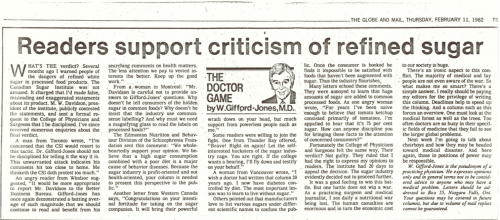Readers support criticism of refined sugar
11 Feb 1982
What’s the verdict? Several months ago I warned people of the dangers of refined white sugar in processed food products. The Canadian Sugar Institute was not amused. It charged that I’d made false, misleading and exaggerated statements about its product. M. W. Davidson, president of the Institute, publicly contested the statements, and sent a formal request to the College of Physicians and Surgeons that I be disciplined. I’ve since received numerous enquiries about the final verdict.
A man from Toronto wrote, “I’m concerned that the CSI would resort to this tactic. Dr. Gifford-Jones should not be disciplined for telling it the way it is. This unwarranted attack indicates his comments hit too close to home. Me thinketh the CSI doth protest too much.”
An angry reader from Windsor suggested, “It would be more appropriate to report Mr. Davidson to the Better Business Bureau. Gifford-Jones has once again demonstrated a batting average of such magnitude that we should continue to read and benefit from his searching comments on health matters. The less attention we pay to vested interests the better. Keep up the good work.”
From a woman in Montreal: “Mr. Davidson is careful not to provide answers to Gifford-Jones’ questions. Why doesn’t he tell consumers of the hidden sugar in common foods? Why doesn’t he insist that the industry use common-sense labelling? And why must we need a magnifying glass to read the labels on processed foods?”
The Edmonton Nutrition and Behaviour Division of the Schizophrenia Foundation sent this comment: “We wholeheartedly support your opinion. We believe that high sugar consumption combined with a poor diet is a major cause of behaviour diseases. Because the sugar industry is profit-oriented and not health-oriented, your column is needed to present this perspective to the public.”
Another letter from Western Canada says, “Congratulations on your intestinal fortitude for taking on the sugar companies. It will bring their powerful wrath down on your head, but much support from powerless people such as me.”
Some readers were willing to join the fight. One from Thunder Bay offered, “Bravo! Right on again! Let the self-interested hucksters of the sugar industry rage. You are right. If the college wants a hearing, I will fly down and testify on your behalf.”
A woman from Vancouver wrote, “I wish a doctor had written that column 20 years ago. I now have diabetes controlled by diet. The most important lesson was to learn to live without sugar.”
Others pointed out that manufacturers love to list various sugars under different scientific names to confuse the public. Once the consumer is hooked he finds it impossible to be satisfied with foods that haven’t been augmented with sugar. Thus the industry flourishes.
Many letters echoed these comments. They were annoyed to learn that huge amounts of sugar are added to common processed foods. As one angry woman wrote, “For years I’ve been naive enough to believe that tomato ketchup consisted primarily of tomatoes. I’m appalled to hear that it’s 75 percent sugar. How can anyone discipline you for bringing these facts to the attention of concerned consumers?”
Fortunately the College of Physicians and Surgeons felt the same way. Their verdict? Not guilty. They ruled that I had the right to express my opinions to readers. The Institute had 20 days to appeal the decision. The sugar industry evidently decided not to proceed further.
It was a good feeling to win this battle. But one battle does not win a war. As a practicing surgeon and medical journalist, I see daily a nutritional war being lost. The human casualties are enormous and in turn the economic cost to our society is huge.
There’s an ironic aspect to this conflict. The majority of medical and lay people are not even aware of the war. So what makes me so smart? There’s a simple answer. I really should be paying my editors for the privilege of writing this column. Deadlines help to speed up the thinking. And a column such as this forces an overview. One must look at the medical forest as well as the trees. Too often doctors are so busy in their specific fields of medicine that they fail to see the larger global problems.
Next week I’m going to talk about choirboys and how they may be headed toward medical disaster. And here again, those in positions of power may be responsible.
W. Gifford-Jones is the pseudonym of a practicing physician. He expresses opinions only and in general terms not to be considered advice to anyone who may have a medical problem. Letters should be addressed to Box 55, Niagara Falls, Ont. Your questions may be covered in future columns, but due to volume of mail replies cannot be guaranteed.



